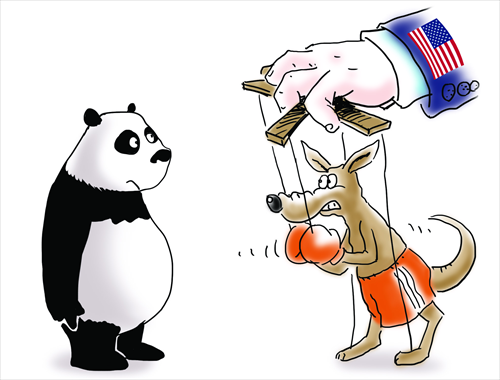Regional peace best suits Oz’s security needs

Illustration: Liu Rui/GT
Half a month after the arbitral tribunal in the Hague ruled against China over the South China Sea disputes, Australia inked a joint statement with the US and Japan, urging China to abide by the arbitration panel's decision. Considering the close Beijing-Canberra economic ties, Australia's intervention in the South China Sea is surprising to many.
In fact, Australia's foreign policy is determined by its diplomatic traditions and national interests. No matter which party is in office, Canberra has always taken a stance accordant with the US on a number of international affairs, and this diplomatic tradition has lasted for decades. Therefore, at a time when the Pentagon stirs up troubles in the South China Sea, the Australian government, in an attempt to pander to its ally, follows suit and involves itself in the disputes regardless of China's interests.
Security is another significant reason that Canberra has stepped into the disputed waters. Surrounded by sea, Australia is particularly sensitive to the security of maritime passage.
The South China Sea is one of the most important lifelines to this maritime state. Any activity in the South China Sea can immediately draw the attention of Canberra, as it has been paying close attention to China's growing military power and reclamation of some islands in the sea. From Australia's perspective, the arbitration is closely related to its domestic and overseas interests.
The Australian government is also attempting to gain bargaining chips for economic interests by pressuring China on the South China Sea issue. Although complementary in trade, Beijing and Canberra have an unbalanced trade structure. By pressuring China on political and security issues, Australia intends to achieve its economic aims.
Canberra's intervention will backfire. To begin with, sovereignty is more than a matter of dignity. Australia should never underestimate China's determination to safeguard its sovereignty in the South China Sea. Freedom of navigation has never been a problem in the South China Sea, so Australia should not worry.
In addition, the Australian government's utilitarianism will only exert a negative influence on the Beijing-Canberra economic cooperation. China has seen rapid development since the reform and opening-up, and consequentially Australia is increasingly dependent on China on the economic front. However, while it hitchhikes on China's rise for economic gains, Canberra courts Washington for security support at the cost of the former's interests. This will for sure upset Sino-Australian economic ties.
As an outsider of the South China Sea arbitration, Australia's intervention will not help find a peaceful solution to the disputes, but will create a confrontational environment instead. The US, Australia and Japan reiterated in the joint statement their commitment "to continue coordinating their respective assistance programs and to identify ways" to collaborate. Their interventions will only push up tensions and exert tremendous negative effects on regional peace and stability.
To settle the disputes, direct contacts and negotiations are needed between China and the South China Sea claimants. Both sides should return to the right track of settling disputes through bilateral negotiations. Australia's security concerns will be gradually dispelled if the problem can be peacefully addressed between China and ASEAN countries. In addition, economic links may help stabilize and strengthen political ties. China and Australia may have more political and security cooperation, rather than confrontation if mutually beneficial economic ties can be further developed and strengthened between the two sides.
Above all, Australia should be aware that negotiations and cooperation, instead of intervention, are the most effective ways to settle the South China Sea disputes.
The author is a research fellow at the Institute of Asia-Pacific Studies of the Chinese Academy of Social Sciences. opinion@globaltimes.com.cn